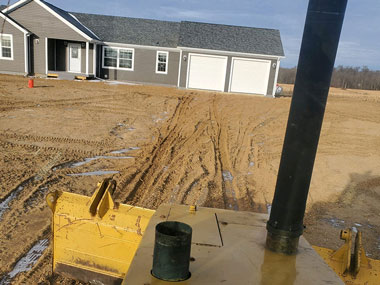
Driveway Installation: Gravel vs. Asphalt (Coldwater Climate Guide)

Thinking about driveway installation in Coldwater, MI? Winter freeze, spring thaws, and heavy summer rains all shape how a driveway performs on your property. If you want a surface that holds up on country roads near the I‑69 corridor or along wooded lots by the Coldwater chain of lakes, the right material and base are key. To see how a professional crew handles grading, drainage, and compaction for long-term results, explore our driveway installation service from Westfall Trucking & Excavating LLC or call 517-227-6127.
What Coldwater Weather Means For Your Driveway
Our winters bring repeated freeze and thaw cycles. Those shifts push and pull at the ground beneath your driveway, a process called frost heave. Spring adds snowmelt and rain, which load your driveway with water. Without a strong base and clear drainage paths, that water softens the subgrade and causes ruts, settling, and cracks.
Water control is everything in Coldwater. The driveway that moves water away from the structure and off the driving surface will outlast one that lets water sit or seep into the base.
Gravel Driveways In Coldwater, MI: Pros And Cons
Gravel is a flexible, budget-friendly option for rural properties and long private drives. It tolerates seasonal movement because the surface can be regraded, and it handles rainfall well when the base is crowned and ditches or swales are set to carry runoff.
- Pros: quick to install, great drainage, easier to adjust or extend, blends with natural settings.
- Cons: needs periodic top-dressing, ruts under repeated turning, dust on dry days, trickier snow removal.
In neighborhoods like Girard Township and Kinderhook Township, gravel works well on sloped sites where directing water into side swales matters more than a perfectly smooth finish. For trailers or boats heading to the lakes, a dense-graded gravel helps resist wheel spin at the apron and turnaround points.
Asphalt Driveways In Coldwater, MI: Pros And Cons
Asphalt delivers a smooth, quiet surface that is easier to shovel or plow in winter. When built on a stable, well-compacted foundation, it resists rutting and looks clean with defined edges.
- Pros: smooth surface for snow removal, neat curb appeal, paintable markings, compatible with concrete aprons.
- Cons: can soften in hot July sun, needs sealing on a routine schedule, sensitive to edge support and standing water.
Mind the edges. Asphalt without shoulder support tends to crumble when vehicles repeatedly drop wheels off the sides. A compacted aggregate shoulder and good drainage at the edges can extend the life of the surface.
Base Preparation: The Non‑Negotiable
Whether you choose gravel or asphalt, the base is the backbone of your driveway. A professional excavation contractor evaluates your native soils, removes unsuitable material, and builds up lift by lift with proper compaction. On softer soils, geotextile fabric can separate the soil from the aggregate so the base does not pump or disappear into the subgrade over time. Compaction matters more than thickness because density is what resists settlement and frost action.
Shaping the driveway with a slight crown or cross slope encourages water to move to ditches or swales. Culverts at the road edge may be needed to maintain roadside drainage; sizes and placements vary by site conditions. For more site prep insights, browse our local excavating tips.
Winter Performance: Plows, Ice, And Freeze–Thaw
Snow removal is where materials feel different. Gravel can be plowed, but the blade must ride above the surface to avoid scooping aggregate. Asphalt is simpler to clear, though care is needed to prevent gouges when ground is heaving during a deep freeze.
Never plow gravel with the blade flat. Keep a small gap or use shoes to protect the stone layer. On asphalt, consider sand for traction in extreme cold, and avoid pooling meltwater near the garage where refreeze can turn to glare ice overnight.
Longevity And Maintenance In South‑Central Michigan
Gravel maintenance focuses on keeping the crown, filling low spots, and adding fresh stone when fines wash away. If the drive starts to hold water, the surface needs to be reshaped and compacted so water leaves quickly. In shaded areas with overhanging trees, monitor for moss or soft spots after long wet periods.
Asphalt maintenance includes crack sealing to keep water out of the base and periodic sealing to refresh the surface. Seal asphalt on a clean, dry surface and when temperatures are suitable so the product cures as designed. Edges need protection. A compacted shoulder or decorative border helps support traffic at the sides.
Local Factors That Shape Your Decision
Every property in the Coldwater area is different. Long, narrow drives on soft ground need thicker, denser base layers than short, straight drives on firm soil. Wooded lots around the lakes may have shade that slows snow melt. Open fields along US‑12 can drift snow across the drive, which influences where to place turnouts and snow storage. Homeowner associations may have style or finish preferences, so check any rules before selecting a surface.
Budget Planning Without Surprises
Most homeowners think in terms of cost per linear foot, but the true drivers are site access, excavation depth, base quality, drainage features, and material availability. A straight run with good access costs less to build than a winding drive with multiple turnouts or a steep approach. Seasonal timing, trucking distance, and the need for culverts also influence your final number. Recycled materials, when appropriate for the site, may add value without sacrificing performance.
If you have a long rural driveway, ask for options that break the project into phases so you can complete critical base work first and top with the final surface later. That approach protects your investment and creates a better long-term outcome than rushing to finish the surface before the base is ready.
How An Excavation Contractor Adds Value
An experienced crew does more than spread stone or lay asphalt. They read the site, manage water with grade and ditches, and build dense, uniform lifts that support traffic through the seasons. A quality contractor also plans staging so equipment does not damage finished areas, protects nearby landscaping, and coordinates with utility locates to keep the job safe and on schedule.
Expect clear communication about soil conditions, base thickness by area, and how runoff will be handled. You should also receive maintenance guidance based on your traffic patterns, like boat trailers near Coldwater Lake or delivery trucks turning at a shop or barn.
Gravel Or Asphalt? A Quick Decision Guide
Use these simple cues to match your property and lifestyle:
- Choose gravel if you need long runs with great drainage and you are comfortable with periodic regrading and top-dressing.
- Choose asphalt if you value a smooth, clean look and easier snow removal, and you are ready to seal and protect it on a schedule.
- On soft soils or shaded sites, invest more in the base either way, and plan edge support for vehicles that run close to the sides.
Still weighing options? Many Coldwater homeowners blend approaches, using asphalt near the garage and an engineered gravel lane beyond, so the high-use area stays clean while long stretches remain cost effective.
Your Next Step In Driveway Installation Coldwater
If you are planning a project this season, start with a base and drainage assessment. You can learn more about driveway installation Coldwater best practices while you gather ideas for layout, aprons, and turnouts. When it is time to compare gravel to asphalt for your specific site, our estimators can walk you through pros, cons, and sequencing that protect the base and surface.
When you are ready, reach out to Westfall Trucking & Excavating LLC at 517-227-6127, or use our driveway installation page to request a site visit. We will help you choose the surface that fits your property, climate, and daily use without compromising long-term performance.